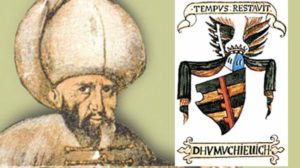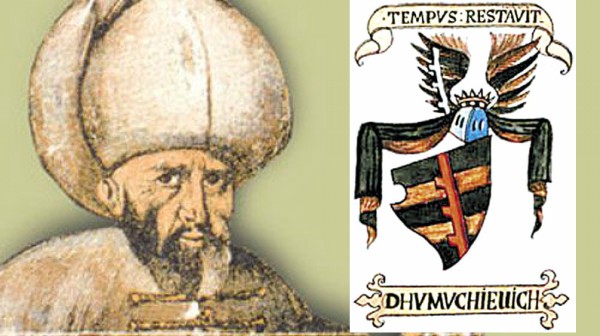
It would appear that history played one of its games with these two individuals. They were born as Serbs, lived at the same time, but were not of Orthodox faith and served two large foreign empires, reaching almost the very apex of power far from their fatherland.
Mehmed-pasha Sokolović was born as an Orthodox Serb (Bajo, according to Dubrovnik records, Bajica) near the present day town of Rudo, in eastern Bosnia. He was taken by the Turks in the well known custom of “tribute in blood” when he was 16-18 years old. Until that moment, he studied within Mileševa monastery.
He was converted to Islam in Tsargrad and received training for janissary during which he was deemed as a very bright and capable student. He advanced quickly in the service. In 1546, now named Mehmed, he became chief in command of the Ottoman fleet. At the height of his power, in 1565, title of Grand vizier, second man of the empire right after the sultan, was bestowed upon him.
Don Pedro Ohmučević Grgurić had a similar experience in the kingdom of Spain. He was born in the vicinity of Slano, near Dubrovnik, as Petar. His father’s name was Ivelja. Fame found him during his service in the Spanish war navy, especially during the battle of Lepant in 1571 after which he received rank of admiral. In attempt to gain privileges and noble title, he forged his origins introducing himself as a descendant of Serbian medieval noble family Ohmučević. To support his claim, he produced false documents, such as false genealogy, which attested to his noble descent.
Both of these, so to speak, distant Serbs, nonetheless emphasized their Serbian origin in similar fashion, through reference to medieval Serbian state. Mehmed-pasha Sokolović said he was descended from “despot of Serbia”, in a conversation with Jacob Ragazoni. French envoy in Tsargrad, Francois de Noah, with anger, spoke of good treatment Dubrovnik had in Porta, due to Sokolović being their “great friend, even more because he was a Serb born quite close to the city of Dubrovnik”.
Petar Ohmučević called upon traditions of imperial Serbia through his submission, to the Spanish administration of Naples (at that time, Spain ruled Naples), of the forged Roll of arms which depicted glorious past of the Dušan empire and Ohmučević lineage. Don Pedro emphasized, for his supposed ancestor, Caesar Relja (Hrelja) from XIV century who, a nobleman of emperor Dušan, died without any heirs as a monk in Bulgarian monastery of Rila, in 1342. As we can see, Mehmed-pasha Sokolović linked himself with Serbian Despotate while don Pedro did the same with Serbian empire.
These two influential Serbs, in their work and through their influence, did one more important thing for Serbian history and culture. Mehmed-pasha Sokolović, being a man of influence in the Ottoman empire, allowed reconstruction and renewal of the Peć Patriarchy in 1557 and place his own cousin, Makarije Sokolović, at its head as a Patriarch. Peć Patriarchy will play an irreplaceable role in nurture and preservation of Serbian identity and spirituality, so the role of Mehmed Sokolović, without regard whether it was driven by interest or sense of belonging to the Serbian people, was important and guided by the invisible hand of history and, preordained to certain extent.
On the other side, don Petar Ohmučević, with his imaginary Roll of arms of the Dušan empire, will set in motion complete, so called, Illyrian heraldic, which will be used by many individuals of importance and national movements after Ohmučević. Through Illyrian heraldic, spirit of Serbian medieval statehood traditions will live on and will be used by Serbian, but also, Croatian national movement.
Illyrian heraldic, instigated by Petar Ohmučević, will have large influence on Serbs during the First Serbian uprising, in which symbols depicted ideological form of historical continuity with medieval Serbia, constructed, in the first place, in Illyrian heraldic.
In this manner, these two men, far from their people, advanced in foreign empires and lived within foreign cultures, but could not erase their true identity, and identity is far more than merely emphasizing the name of your people.
Author Boris Radakovic translate Ljubisa Malenica
Донирајте или се рекламирајте на „Срби у Босни и Херцеговини кроз епохе и судбине“ једином сајту на свијету који описује живот нашег народа на просторима БиХ од насељавања Срба у 7. вијеку до одбрамбено-отаџбинског рата а кроз призме политичке, културне и духовне историје.

